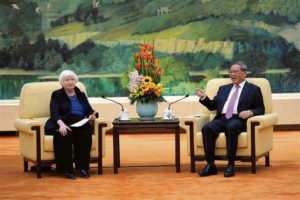US, Britain, Australia weigh expanding AUKUS security accord to deter China
LONDON: The US, Britain and Australia are set to begin talks on bringing new members into their AUKUS security pact as Washington pushes for Japan to be involved as a deterrent against China, the Financial Times (FT) reported.
The countries’ defence ministers will announce discussions on Monday on “Pillar Two” of the pact, which commits the members to jointly developing quantum computing, undersea, hypersonic, artificial intelligence and cyber technology, the newspaper reported on Saturday, citing people familiar with the situation.
They are not considering expanding the first pillar, which is designed to deliver nuclear-powered attack submarines to Australia, the FT said.
AUKUS, formed by the three countries in 2021, is part of their efforts to push back against China’s growing power in the Indo-Pacific region. China has called the AUKUS pact dangerous and warned it could spur a regional arms race.
US President Joe Biden has sought to step up partnerships with US allies in Asia, including Japan and the Philippines, amid China’s historic military build-up and its growing territorial assertiveness. Rahm Emanuel, US ambassador in Tokyo, wrote in an opinion piece in the Wall Street Journal on Wednesday that Japan was “about to become the first additional Pillar II partner”. A senior US administration official said on Wednesday that some sort of announcement could be expected in the coming week about Japan’s involvement but gave no details.
Biden and Japanese Prime Minister Fumio Kishida will likely discuss expanding AUKUS to include Japan when the President hosts the PM in Washington on Wednesday, a source with knowledge of the talks said. Australia, however, is wary of beginning new projects until more progress has been made on supplying Canberra with nuclear-powered submarines, said the source.
Comments




 Driving Naari Programme launched in Chandigarh
Driving Naari Programme launched in Chandigarh Punjab farmers reaping benefits of Mann Government’s crop diversification initiatives
Punjab farmers reaping benefits of Mann Government’s crop diversification initiatives Punjab and Kerala Join Hands to Address NRI Concerns
Punjab and Kerala Join Hands to Address NRI Concerns Macron refuses French Prime Minister’s resignation after chaotic election results
Macron refuses French Prime Minister’s resignation after chaotic election results Modi lands in Russia for first visit since Ukraine offensive
Modi lands in Russia for first visit since Ukraine offensive Saudi Arabia approves granting citizenship to global experts under Vision 2030
Saudi Arabia approves granting citizenship to global experts under Vision 2030 Vigilance arrests Panchayat Secretary, former Sarpanch for embezzlement in Panchayat funds
Vigilance arrests Panchayat Secretary, former Sarpanch for embezzlement in Panchayat funds Housing crisis in Canada forcing residents to move out of pricier cities: Poll
Housing crisis in Canada forcing residents to move out of pricier cities: Poll Historic Milestone: Canada Appoints Its First Female Chief of Defense
Historic Milestone: Canada Appoints Its First Female Chief of Defense Victory parade of T20 World Cup-winning Indian cricket team concludes in Mumbai
Victory parade of T20 World Cup-winning Indian cricket team concludes in Mumbai Maximizing impact of Aadhar in Punjab
Maximizing impact of Aadhar in Punjab Amritpal Singh to take oath as Khadoor Sahib MP on July 5
Amritpal Singh to take oath as Khadoor Sahib MP on July 5 Driving Naari Programme launched in Chandigarh
Driving Naari Programme launched in Chandigarh Punjab farmers reaping benefits of Mann Government’s crop diversification initiatives
Punjab farmers reaping benefits of Mann Government’s crop diversification initiatives Punjab and Kerala Join Hands to Address NRI Concerns
Punjab and Kerala Join Hands to Address NRI Concerns Macron refuses French Prime Minister’s resignation after chaotic election results
Macron refuses French Prime Minister’s resignation after chaotic election results Modi lands in Russia for first visit since Ukraine offensive
Modi lands in Russia for first visit since Ukraine offensive Saudi Arabia approves granting citizenship to global experts under Vision 2030
Saudi Arabia approves granting citizenship to global experts under Vision 2030 Vigilance arrests Panchayat Secretary, former Sarpanch for embezzlement in Panchayat funds
Vigilance arrests Panchayat Secretary, former Sarpanch for embezzlement in Panchayat funds Housing crisis in Canada forcing residents to move out of pricier cities: Poll
Housing crisis in Canada forcing residents to move out of pricier cities: Poll Historic Milestone: Canada Appoints Its First Female Chief of Defense
Historic Milestone: Canada Appoints Its First Female Chief of Defense Victory parade of T20 World Cup-winning Indian cricket team concludes in Mumbai
Victory parade of T20 World Cup-winning Indian cricket team concludes in Mumbai Maximizing impact of Aadhar in Punjab
Maximizing impact of Aadhar in Punjab Amritpal Singh to take oath as Khadoor Sahib MP on July 5
Amritpal Singh to take oath as Khadoor Sahib MP on July 5